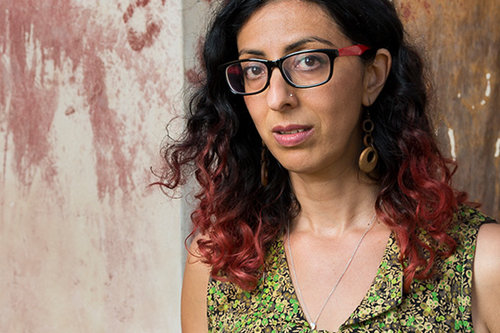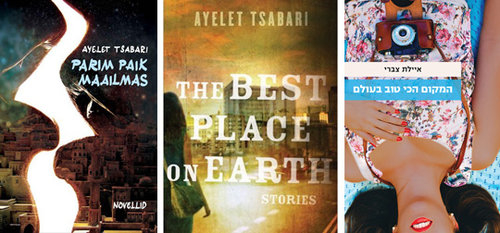Ayelet Tsabari (2009 cohort)
 In the winter of 2009 I was in a beach hut in Belize, run by a local named Ignacio who was known to chase trespassers with a machete. One morning I found a Wi-Fi signal for the first time in days and opened my email to find an invitation to attend the University of Guelph Creative Writing MFA. I grabbed my partner’s thigh and dug my fingernails into it, pointing at the screen without speaking.
In the winter of 2009 I was in a beach hut in Belize, run by a local named Ignacio who was known to chase trespassers with a machete. One morning I found a Wi-Fi signal for the first time in days and opened my email to find an invitation to attend the University of Guelph Creative Writing MFA. I grabbed my partner’s thigh and dug my fingernails into it, pointing at the screen without speaking.
Enrolling in an MFA program had been a dream of mine; one I’d thought was beyond reach. I had been taking part-time writing courses for a couple of years and I wanted more. An MFA seemed like a natural choice, an opportunity to immerse myself in my craft, learn from established authors and professionalize my writing. But I was ineligible for most programs: I didn’t have a BA, had never gone to university, and at thirty-six didn’t see an undergrad in my future.
One day, I met my friend Janet for coffee to celebrate her good news: she had been accepted to the new University of Guelph MFA program in Toronto. You should apply too, Janet said. Apparently, she had never completed her BA. Suddenly, a glimmer of hope. When I came home I read about the program and the fantastic writers who taught in it, found that “a limited number of students may be admitted to the MFA without having satisfied the degree requirement…based on other experience and practice.” It seemed too good to be true.
 Enrolling in the MFA was everything I wanted. Still, that first semester I was often riddled with anxiety and doubt. Because chasing your dreams and committing to life as a writer is frightening, because I’d only been writing in English for about three years, because as an immigrant and a minority I feared my writing was inherently different, not Canadian enough, because I had been a waitress for thirteen years and was afraid to hope for a different life. And because I had never gone to university and felt intimidated, outside my comfort zone. But of course, being forced outside my comfort zone was exactly what I needed to grow as a writer.
Enrolling in the MFA was everything I wanted. Still, that first semester I was often riddled with anxiety and doubt. Because chasing your dreams and committing to life as a writer is frightening, because I’d only been writing in English for about three years, because as an immigrant and a minority I feared my writing was inherently different, not Canadian enough, because I had been a waitress for thirteen years and was afraid to hope for a different life. And because I had never gone to university and felt intimidated, outside my comfort zone. But of course, being forced outside my comfort zone was exactly what I needed to grow as a writer.
A month after I defended my thesis, a collection of stories titled The Best Place on Earth, I signed a book deal with HarperCollins. The collection was envisioned, created, fostered and edited during my two years in the program. I had initially planned on writing a different book, felt too daunted by the idea of writing about my messed-up homeland, unprepared for the responsibility, despite the strong pull I had felt toward the subject. It was during “Writers in the World,” the plenary course taught by Catherine Bush, that I began to reconsider the way my writing engaged (or rather didn’t engage) with the world. Reading work by authors who wrote bravely about their own messed-up homelands, and participating in the classroom discussions they spurred, inspired me to try. I was fortunate to have Camilla Gibb as a mentor and a thesis advisor. Camilla pushed me to work harder than I had ever worked before—we referred to the mentorship as Fiction Boot Camp—while encouraging me to own my voice. She made me believe there was room for my fiction in the world.
I walked out of the program with another book in the works, a collection of essays I had worked on during the creative non-fiction workshop. I walked out with better job prospects (upon graduating, I got work as a creative writing instructor at two continuing studies programs), and I walked out with a supportive writing community, close friends from my cohort, from other cohorts, and amongst the faculty as well. Six years after graduation, these are the friends I turn to for feedback on my writing, career advice, or for literary hangouts.
Website: www.ayelettsabari.com
Essay: Why I Chose to Write in English, Literary Hub, March 2016
Essay: What Nobody Tells You, The Afterword, The National Post, March 2013
Interview: An Interview with CWILA, February 2014
Audio: Interview with Marrie Stone at Writers on Writing, KUCI-FM, Southern California, April 13, 2016
Video: The Best Place on Earth Book Trailer
Ayelet Tsabari was born in Israel to a large family of Yemeni descent. Her first book, The Best Place on Earth, (HarperCollins) won the Sami Rohr Prize for Jewish Literature and the Edward Lewis Wallant Award, and was long listed to the Frank O’Connor International Short Story Award. The Best Place on Earth was a New York Times Book Review Editors’ Choice, a Kirkus Review best book of 2016, and has been published internationally to great acclaim. Excerpts from her forthcoming book of essays have won a National Magazine Award, a Western Magazine Award, and The New Quarterly ‘s Edna Staebler award. In 2014, she was awarded a Chalmers Arts Fellowship. She is a graduate of the Creative Writing MFA Program at Guelph and lives in Toronto.
[featured: fall 2017]